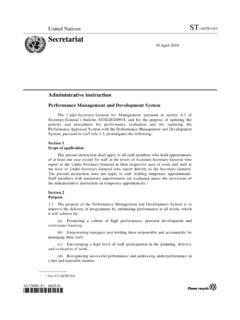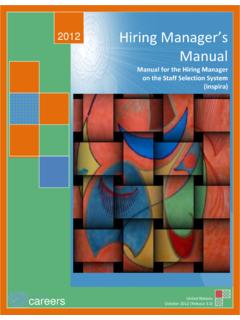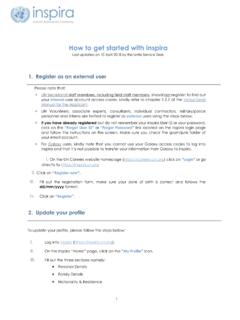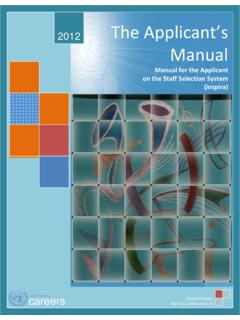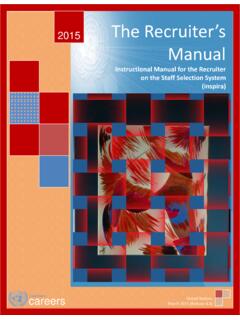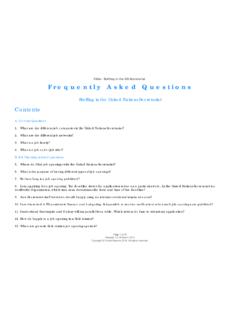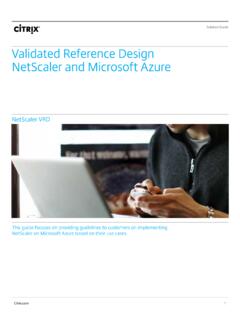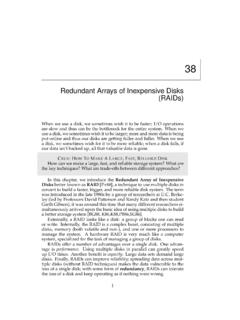Transcription of Competencies UnitedNations
1 United NationsCompetenciesFuturefor theIt is my hope that Competencies will provide us with shared language for talking, in concrete terms, about high performance and managerial excellence. I believe that a shared view of the standards we are striving to achieve will assist us in our continuing efforts to preparethe Organization to meet the challenges of the 21st century. Kofi AnnanSecretary-General Introduction to CompetenciesIn Building the Future , the Secretary-General has indicated that the Organization s greatest strength and the key to our success is the quality of our staff and managers. He has stressed that, to capitalize on this strength, we need to create an organizational culture and environment that enables staff to contribute to their maximum in other organizations has shown that when seeking to create a new culture and build human resources capacity for the future, it is important to define organizational core Competencies the combination of skills, attributes and behaviours which are essential for all staff as well as the additional managerial Competencies required by all those who manage others.
2 Once organizational Competencies have been defined, they can be used as a base on which to build and strengthen other humanresources systems such as recruitment, placement, development and performance , a participatory process, involving staff and managers throughout the Secretariat, was undertaken to define core and managerial Competencies for the United Nations Secretariat. This booklet has been prepared to inform staff of the United Nations Competencies for the future, to describe how these Competencies were arrived at, to provide examples of how the Competencies look in action and to indicate how they will be applied in the Secretariat. The term competency refers to a combination of skills, attributes and behaviours that are directly related to successful performance on the job. Core Competencies are the skills, attributes and behaviours which are considered important for all staff of the Organization, regardless of their function or Competencies are the skills, attributes and behaviours which are considered essential for staff with managerial or supervisory are Competencies ?
3 Defining Competencies is important both for the Organization and for staff. Competencies are forward-looking. They describe the skills and attributes staff and managers will need in order to build a new organizational culture and meet future challenges. They help organizations clarify expectations, define future development needs, and do more focused recruitment and development planning. Competencies provide a sound basis for consistent and objective performance standards by creating shared language about what is needed and expected in an and managerial Competencies are not specific to any occupation. One could demonstrate the competency of teamwork or client orientation , for example, in performing any job. Specific technical Competencies are not included in the model of United Nations Competencies for the complement the core Competencies , individual departments may choose to define functional Competencies related to their respective areas of work.
4 Why are Competencies important ?IInterviewsAs part of the process, interviews were conducted with the Deputy Secretary-General and twenty-four Under-Secretaries-General and Assistant Secretaries-General who head Departments and Offices throughout the Secretariat. They were asked about theOrganization's environment, stakeholders, work outputs and future challenges. Informationdrawn from the interviews provided an overall context for the work of focus groups. Competencies decided?How were the United Nations Core and managerial Competencies for the United Nations Secretariathave been developed through a participatory process taking intoaccount the diversity of levels, functions, cultures and geographic locations of the GroupsSeventeen focus groups, comprising a cross section of staff from different departments at all levels, were held in six duty stations.
5 The focus groups participated in a day-longprocess of examining the Organization's environment, the work we do and expect to do in the future, and the needs of our clients and stakeholders. Each group came to a consensus on the most important Competencies and values for all international civil servants, as well as the additional Competencies required by staff who manage the Competency ModelThe Competencies defined by all groups were sorted and analysed. Similar competencieswere grouped together and a common term chosen for each grouping. Using the mostfrequently occurring items, a model was developed with eight core Competencies and six managerial Competencies . Organizational Core ValuesOrganizational values are the shared principles and beliefs that underpin the work ofan organization and guide the actions and behaviours of its staff.
6 During the participa-tory process, integrity , respect for diversity and professionalism emerged as the Organization s core values, and they have been included in the model. They are consonant with the United Nations Charter and with the core values set out in Article Iof the Staff will theStaff DevelopmentStaff development programmes will be aligned with the Competencies and new programmes introduced to support their development. A guide will be preparedexplaining the various means available to acquire and strengthen Competencies . Career Planning Competencies will increasingly be used as a basis for identifying individual and organizational needs and planning for development. Support will be provided to staff through publications and career support ManagementCompetencies will be useful to staff and managers in assessing development needs and setting performance standards.
7 Competencies will be incorporated in subsequent revision of the be used? Competencies include a combination of skills, attributes and behaviours that need to be developed and strengthened throughout one's career. Acquiring a competency is not a one-time event, but rather an ongoing process. Formal training can help, but experience, coaching, feedback and individual learning activities are needed as well. To assist staff in using Competencies in their daily work and planning for their continuous learning and development, ongoing information and guidance will be provided by OHRM. acquire the Competencies ?RecruitmentGradually, Competencies will be incorporated into generic job descriptions and vacancy announcements. Interview frameworks and other tools will be developed to incorporate Competencies into recruitment and placement decisions, and staff will be trained in the use of these do I Integrity Professionalism Respect for DiversityWhat are the UN core values and Competencies ?
8 Core Values Communication Teamwork Planning & Organizing Accountability Creativity Client Orientation Commitment to Continuous Learning Technological AwarenessCore Competencies Leadership Vision Empowering Others Building Trust Managing Performance Judgement/Decision-makingManagerial CompetenciesWhat docompetencies look likein practice? As Competencies relate more to what a person does, than what a person knows, they are observable. For each competency it is possible to describe behavioural indicators actions or behaviours thatexemplify the competency in practice. These may be helpful in promoting shared values and common standards of performance and behaviour throughout the following pages set out the organizational core values, core Competencies and managerial Competencies ,followed by behavioural indicators.
9 These indicatorsare indicative only. They are not intended to describe all the behaviours related to a competency. Integrity Demonstrates the values of the United Nations in daily activities and behaviours Acts without consideration of personal gain Resists undue political pressure in decision-making Does not abuse power or authority Stands by decisions that are in the Organization s interest, even if they are unpopular Takes prompt action in cases of unprofessional or unethical behaviour Professionalism Shows pride in work and in achievements Demonstrates professional competence and mastery of subject matter Is conscientious and efficient in meeting commitments, observing deadlines and achieving results Is motivated by professional rather than personal concerns Shows persistence when faced with difficult problems or challenges Remains calm in stressful situations Respect forDiversity Works effectively with people from all backgrounds Treats all people with dignity and respect Treats men and women equally Shows respect for and understanding of diverse points of view and demonstrates this understanding in daily work and decision-making Examines own biases and behaviours to avoid stereotypical responses Does not discriminate against any individual or group Communication Speaks and writes clearly and effectively Listens to others, correctly interprets messages from others and responds appropriately Asks questions to clarify.
10 And exhibits interest in having two-way communication Tailors language, tone, style and format to match the audience Demonstrates openness in sharing information and keeping people informedTeamwork Works collaboratively with colleagues to achieve organizational goals Solicits input by genuinely valuing others ideas and expertise; is willing to learn from others Places team agenda before personal agenda Supports and acts in accordance with final group decision, even when such decisions may not entirely reflect own position Shares credit for team accomplishments and accepts joint responsibility for team shortcomings Planning &Organizing Develops clear goals that are consistent with agreed strategies Identifies priority activities and assignments; adjusts priorities as required Allocates appropriate amount of time and resources for completing work Foresees risks and allows for contingencies when planning Monitors and adjusts plans and actions as necessary Uses time efficiently Accountability Takes ownership of all responsibilities and honours commitments Delivers outputs for which one has responsibility within prescribed time, cost and quality standards Operates in compliance with organizational regulations and rules Supports subordinates, provides oversight and takes responsibility for delegated assignments Takes personal responsibility for his/her own shortcomings and those of the work unit, where applicable.
